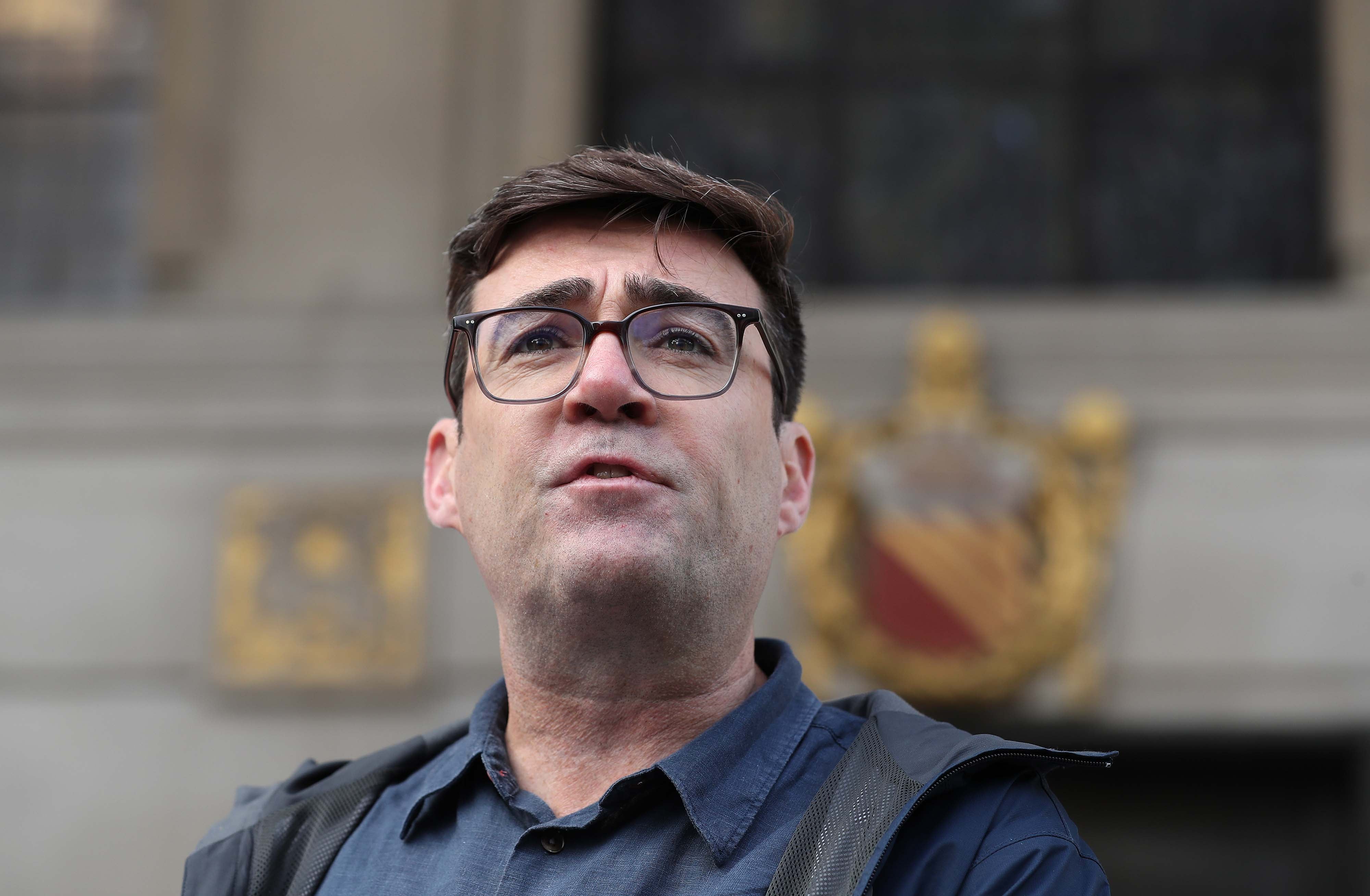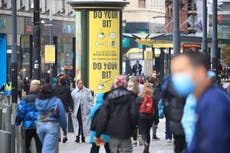Coronavirus: Breakdown of talks brings imposition of tier 3 restrictions in Manchester a step closer
Talks halted ‘abruptly’ as government resists call for more financial support

Your support helps us to tell the story
From reproductive rights to climate change to Big Tech, The Independent is on the ground when the story is developing. Whether it's investigating the financials of Elon Musk's pro-Trump PAC or producing our latest documentary, 'The A Word', which shines a light on the American women fighting for reproductive rights, we know how important it is to parse out the facts from the messaging.
At such a critical moment in US history, we need reporters on the ground. Your donation allows us to keep sending journalists to speak to both sides of the story.
The Independent is trusted by Americans across the entire political spectrum. And unlike many other quality news outlets, we choose not to lock Americans out of our reporting and analysis with paywalls. We believe quality journalism should be available to everyone, paid for by those who can afford it.
Your support makes all the difference.Talks over tougher coronavirus restrictions for Greater Manchester have ended without agreement, raising the prospect that Boris Johnson will now enforce measures including the closure of pubs against the will of local leaders.
A meeting of Greater Manchester leaders with local government secretary Robert Jenrick is understood to have ended “very abruptly” as the government resisted mayor Andy Burnham’s demand for more financial support for businesses and workers.
The breakdown of talks came as the government warned that intensive care units (ICUs) in Greater Manchester could be overwhelmed by Covid-19 cases by 12 November, even if hospitals use all the surge capacity available to them.
And a 17-day “firebreak” lockdown was announced in Wales, where all non-essential retail, leisure, hospitality and tourism businesses will close and residents will be required to stay at home from 6pm on Friday until 9 November.
Mark Drakeford, the Welsh first minister, said the move would provide a “short, sharp, shock to turn back the clock, slow down the virus and give us more time”.
The developments came as the latest figures showed 18,804 positive tests and 80 deaths due to coronavirus were recorded in the 24 hours to 9am on Monday.
Mr Johnson has said that he wants to move Manchester into the toughest tier of his regional alert system with the co-operation of local leaders, but is ready to overrule them if agreement cannot be reached.
Downing Street described the failure to reach agreement as “disappointing” but refused to say whether the prime minister was now poised to intervene, saying only that the government was “considering next steps”.
Mr Burnham has written to the PM expressing his disappointment at the outcome of talks, and voicing his concern that proposals for support for low-paid workers were ruled out by ministers despite having received a positive response from officials earlier in the day.
Greater Manchester sources said that the city’s leaders were “ready to continue to work with the government to find a resolution”.
Mr Burnham is insisting on support for the thousands of workers who would lose income if Manchester follows Merseyside and Lancashire into tier 3, forcing pubs, bars and other businesses to close. He wants a furlough payment worth 80 per cent of wages, rather than the 67 per cent on offer from chancellor Rishi Sunak, as well as help for the self-employed.
A government spokesperson said: “A meeting between government and local leaders in Greater Manchester has concluded this afternoon following discussions throughout last week, over the weekend and this morning on measures necessary to protect the public.
“Disappointingly, we have still not been able to reach an agreement. This is particularly concerning against the backdrop of rising cases and hospitalisations in Greater Manchester. We are carefully considering next steps.”
Mr Burnham has pointed to signs that positive tests have been levelling off in a number of Greater Manchester council areas in recent days as a sign that the existing restrictions in the city are having an effect on infection rates.
But Downing Street pointed to the rise in positive cases involving the more vulnerable over-60 age-group, which had trebled in 15 days from 89 per 100,000 population on 27 September to 282 on 12 October.
Numbers of Covid-19 patients in ICUs in the city had reached 40 per cent of the level at the height of the first wave in the spring and the number is expected to rise “significantly” over the coming weeks, he said.
On the “best case” assumption of the government’s SPI-M advisory group, rates will double every 14 days as the lag between infections and hospitalisations works its way through, said the spokesman.
On that basis, Greater Manchester’s ICU capacity can be expected to be used up by 28 October. By 2 November, ICU occupancy by coronavirus patients would outstrip the peak of the first wave and by 8 November, Covid patients alone would entirely fill ICU beds.
Even if hospital managers implement “surge” measures to free up more intensive care beds for coronavirus patients, capacity will be reached by 12 November, said the PM’s spokesman, though this does not include spaces in Manchester’s Nightingale field hospital, which has been put on standby.
The Health Service Journal said that Greater Manchester’s hospitals had seen a new surge in coronavirus patients over the last 24 hours, with numbers of occupied beds rising from just over 500 to around 650.
This would be the largest single day rise since the start of the second wave in September, with the new total representing around 11 per cent of normal bed capacity. There has been a fairly consistent increase over the last month. At the peak of the first wave, just over 1,000 beds were occupied by Covid-positive patients.
Dr Indeewar Kapila, an intensive care consultant in Manchester, said the situation in the city’s hospitals was “very concerning”, with around one-third of ICU beds currently filled.
“We have about 440 cases per 100,000, which is extremely high, we are very concerned that we may reach a situation very soon where intensive care beds are beginning to run out,” Dr Kapila told BBC Radio 4’s Today programme.
Health secretary Matt Hancock told the House of Commons that the government was “working hard to reach an agreement in Greater Manchester and doing everything in our power to suppress the virus, support the economy, support and education and protect the NHS until a vaccine is available”.
He told MPs: “That is the right strategy – charting a path that allows for the greatest economic and social freedom while protecting life.”
In a rebuke to those resisting tighter restrictions, Mr Hancock said that allowing the virus to run free would be “simply unethical”.
“I know that this is difficult and I know that it is relentless, but we must have resolve and see this through and never stop striving to support the science that will one day make us safe,” he said.
Mr Hancock said that talks would continue later this week with civic leaders in West Yorkshire, South Yorkshire, Nottinghamshire, the northeast and Teesside on the possibility of moving the areas up from the middle “high alert” second tier to tier 3 restrictions.




Join our commenting forum
Join thought-provoking conversations, follow other Independent readers and see their replies
Comments